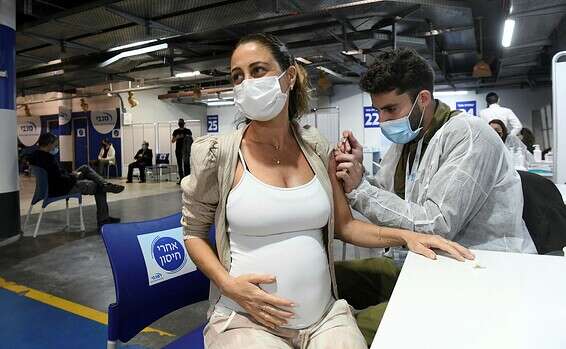3 Studies conducted at Sheba Hospital reinforce the conclusion that the vaccine does not cause side effects in pregnancy or complications in childbirth • "may protect the fetus"
Pregnant women get vaccinated at the Maccabi compound in Givatayim (archive)
Photo:
Yossi Zeliger
Three studies conducted at Sheba Hospital reinforce the recommendations that the corona vaccine is safe for pregnant women and does not cause side effects or complications of pregnancy or childbirth.
Studies also show that a "secondary benefit" of a pregnancy vaccine may also protect the fetus.
The Ministry of Health recommends that pregnant women get vaccinated against corona in the second and third trimesters of pregnancy.
This, after the third wave, among other things, saw an increase in the number of pregnant women hospitalized following Corona, to a peak of about 50 pregnant women a day.
This is in contrast to other health organizations that mentioned the possibility of getting vaccinated during pregnancy but without a recommendation.
The first study, which examined 390 pregnant women who were vaccinated during pregnancy, found that the side effect profile was similar to 100 women who were not pregnant.
A side effect of fever above 39 degrees, which is considered to be a factor that may be related to fetal malformations, appeared in only 0.8% of pregnant women.
No abnormal rate of obstetric complications such as bleeding, contractions or dehydration was recorded.
There were zero preterm births (below week 37) and zero miscarriages.
It was also found that a side effect of muscle and joint pain was more common in women who were not pregnant.
Furthermore, all pregnant women who were vaccinated developed antibodies, but the level of antibodies was lower compared to non-pregnant women.
A good vaccine from recovery
Another study found that corona-neutralizing antibodies that developed in mothers following the vaccine passed to the baby.
The study included 64 women who were vaccinated, at an average week of 32. Among other things, it was found that 98% of umbilical cord blood samples and 96% of neonatal blood samples were positive for antibodies.
There was a correlation between the level of antibodies in maternal blood and the level of antibodies in umbilical cord blood and neonatal blood.
Comparing vaccinated and recovering pregnant women, higher levels of antibodies were found in both maternal blood (at birth) and umbilical cord blood in vaccinated women compared to recovering women.
A study that found similar findings was also conducted at Hadassah.
The third study examined the effect of the vaccine, this time after birth, on the formation of antibodies in breast milk.
The study examined 61 women who were six to 12 months postpartum.
In all samples there was evidence of antibodies against corona, with half of the samples having the virus neutralized by the milk under laboratory conditions.
However, when antibodies were tested in the blood of breastfed infants, there was no evidence of antibodies.
That is, the antibodies from the milk do not pass from the digestive tract into the blood of the babies.
At the same time, an infant saliva test was performed and it was found that there were antibodies near breastfeeding, but the farther away from breastfeeding, the lower the antibody levels.
A similar study was done in Ichilov but included only ten women and was done near the vaccine and not in the long term.
"We do not yet know how long the maternal vaccine protects the baby, but we estimate that the antibodies in the maternal vaccine protect the baby for a period of six months, similar to other viral studies such as pertussis vaccines," explains Prof. Yoav Yinon, director of the Sheba Fetal Medicine Unit. Together with Prof. Gili Regev Yochai, Director of the Infection Prevention Unit at Sheba.
Prof. Yinon added: "I recommend that pregnant women get vaccinated, because infection with corona can cause a serious illness in pregnancy. It is not known what the ideal time for vaccination is, but it is important that women be vaccinated in the third trimester. The study gives confidence that at least in the immediate term women respond well to the vaccine. "I was worried about midwives. I felt confident before recommending the vaccine, but now it gives another seal of approval and helps explain the issue."
"The Ministry of Health was clearer in its recommendations for pregnant women compared to other bodies. In retrospect we saw that it was true, we saw severe morbidity in pregnancy and a number of deaths and we thought the pregnancy vaccine was effective, and there is a secondary benefit that is protecting the baby."
HMO data show that most pregnant women choose to get vaccinated.
In Clalit, we vaccinated about 70% of the pregnant women (more than 59,000 women), and in Maccabi 75% (about 16,300 women).
In Meuhedet we vaccinated about 77% of the pregnant women (more than 10,000) and in Leumit we vaccinated about 65% of the pregnant women.
The Ministry of Health said that "since the beginning of the epidemic, 11,094 women have been diagnosed with the virus while pregnant. Of these, 149 pregnant women have reached a more or less serious condition. Of these, five pregnant women have died."

